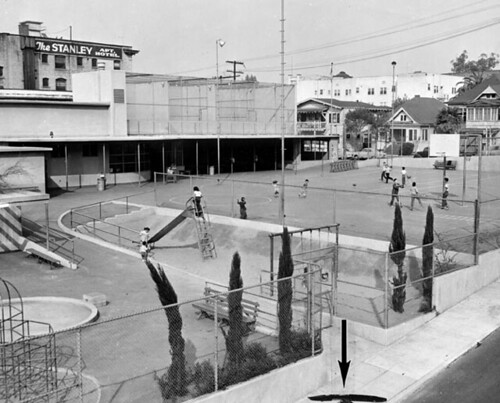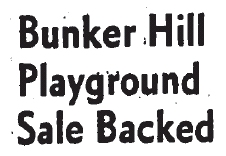On May 27, 1947, Proposition B, a $12 million bond issue passed, allowing the city to sink some serious dough into its woefully inadequate parks, playgrounds, and municipal pools. One of the first neighborhoods slated to get a new playground and community recreation center was Bunker Hill, with a site at the corner of 2nd and Hope, just over half an acre, selected and purchased by the City. After a November 14, 1949 groundbreaking, the $121,646 modern recreation facility was dedicated on August 21, 1950.

In addition to grounds with a wading pool, basketball courts, and playground equipment, the nearly 9000-square foot recreation hall featured a stage for movie screenings and theatrical productions, classrooms, a kitchen, showers, and handball courts (on the roof, no less). Sure, it’s a little institutional-looking, and sure, it could do with a little less concrete, some foliage that doesn’t look so spindly and diseased, and maybe some wood chips under the monkey bars to protect tender young heads, but still, it’s a pretty spiffing playground.
And a long time coming, too. Residents of Bunker Hill had been clamoring for a neighborhood recreation area for over 25 years, lamenting the fact that children in the neighborhood lived in cramped quarters and had no place to play safely. A playground, residents said, would help alleviate the truancy, delinquency, and other youth problems in the neighborhood.
But the thing was, until 1923, Bunker Hill had a very fine recreation area for children… until the City tore it down to make way for the new Central Library.
After the Normal Hill School area was razed, Mrs. Harry White wrote to the City Council, pleading for a playground for the neighborhood’s children:
"They are not permitted to play in the streets, and as most of them live in rented houses without grounds there is no provision for any sort of recreation, or for the care of these children. Many of the parents are working people and the children are alone all day."
In the 25 years without a recreation area, kind-hearted Bunker Hill residents did their best to fill in the gaps. Mr. and Mrs. Herbert Abbott of 220 S. Bunker Hill Avenue organized beach outings, holiday parties and free movies for hundreds of children in the neighborhood, while Mrs. Pearl Alcantara founded the Children’s Community Garden in a vacant lot at California and Grand, after her son was killed by a car while playing in the street. About 50 boys and girls helped her to clear the lot of trash and rocks (although some adult neighbors who weren’t keen on the idea would scatter more trash and rocks at night).
 During the 12 years that the Bunker Hill Playground served the neighborhood, its facilities were tremendously popular, and its programs well-attended. However, it wouldn’t last long. In 1962, the Department of Parks and Recreation recommended sale of the playground and recreation center to the CRA for $325,000. Within a year, the City Council would approve the sale, cash the check, and soon, the playground was just another Bunker Hill ghost.
During the 12 years that the Bunker Hill Playground served the neighborhood, its facilities were tremendously popular, and its programs well-attended. However, it wouldn’t last long. In 1962, the Department of Parks and Recreation recommended sale of the playground and recreation center to the CRA for $325,000. Within a year, the City Council would approve the sale, cash the check, and soon, the playground was just another Bunker Hill ghost.
Image from the Los Angeles Public Library Photo Collection

